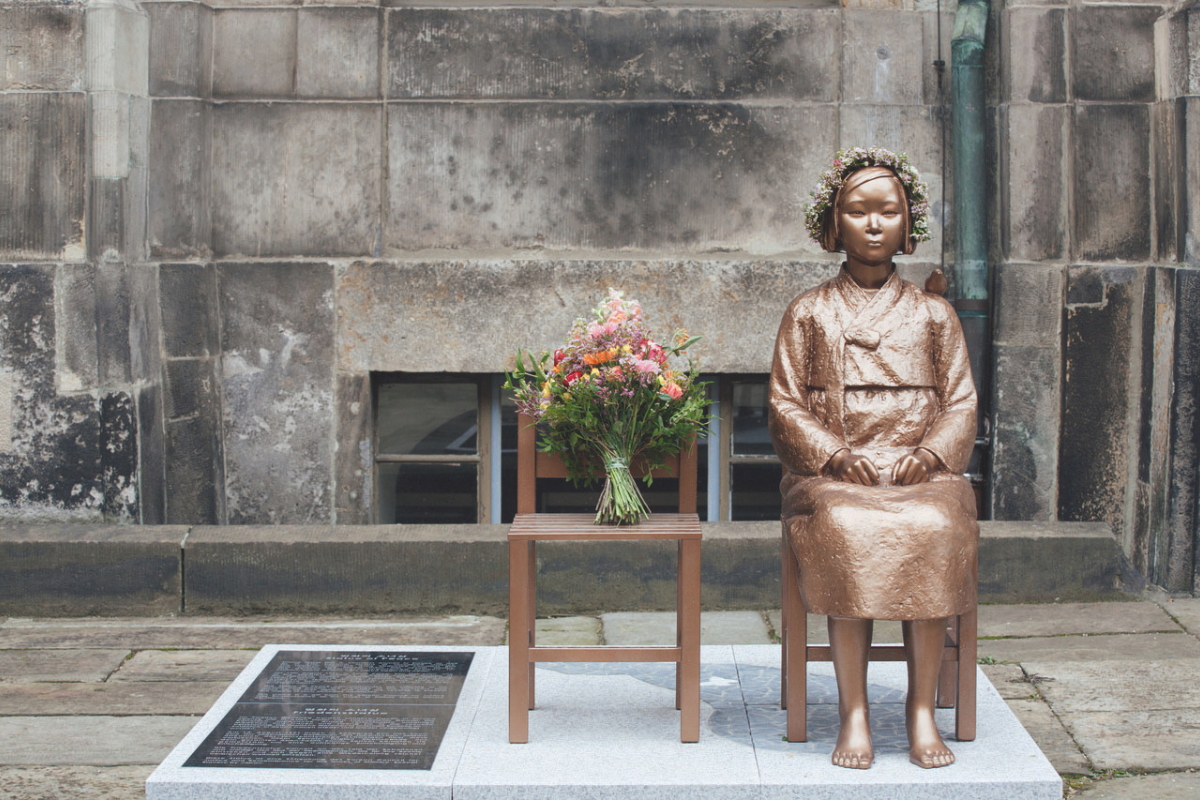After the Mayor of Cologne initially prohibited the installation of the Statue of Peace “Đồng Mai” in front of the NS Documentation Center, the statue will now be unveiled on March 8 as part of the International Women’s Day rally and will remain there for three months.
Đồng Mai (銅梅) (Vietnamese) combines the symbolism of the resilient plum blossom (Mai) with the enduring strength of bronze (Đồng), representing the unshakable strength, beauty, and perseverance of the Statues of Peace. Đồng Mai is the sister statue of Ari (Armenian: “the brave”) in Berlin and Nujin (Kurdish: “new life”) in Kassel.
The Statue of Peace “Đồng Mai” as part of the exhibition “Art Against Forgetting”
rom March 8 to June 1, 2025, the NS Documentation Center Cologne (NS-DOK) will present the exhibition “Art Against Forgetting” as a supplement to the traveling exhibition “The Third World in the Second World War”. The exhibition sheds light on the often-overlooked consequences of World War II in Africa, Asia, and Oceania. Both the fascist Axis powers and the Allies forcibly recruited auxiliary troops and laborers in these regions, while hundreds of thousands of women—among them the so-called “comfort women”—were subjected to sexualized violence.
Despite these far-reaching consequences, the experiences of many countries receive little attention in Western historiography. This is where the long-term historical project initiated by the Rheinisches JournalistInnenbüro in Cologne in the 1990s—and continued since 2000 by the non-profit associationrecherche International e.V.—comes in.
Suppression instead of remembrance: The contested site of the Statue of Peace in Cologne
A central element of the exhibition is the installation of the Statue of Peace “Đồng Mai” in front of the NS Documentation Center. Although four municipal departments had been involved in preparations for two years, and the statue was already registered with the Public Order Office and the municipal museum insurance, Mayor Henriette Reker refused to grant approval. Neither the Mayor nor the Office for Europe and International Affairs provided substantive reasons for the ban. However, it is well-known that the installation of the Statue of Peace often triggers diplomatic protests and interventions by the Japanese government—most recently in Berlin. It is therefore likely that, instead of sending a message of solidarity with the survivors, Cologne yielded to Japanese pressure—possibly in light of the planned city partnership with Kyoto.
Subsequently, the City of Cologne took steps to remove the statue from public space—suggesting alternative locations whose appropriateness must be strongly questioned. Initially, it was proposed to move it to the backyard of the NS Documentation Center—the very site where the Gestapo executed around 400 people. As another “alternative,” the Office for International Affairs suggested the courtyard of St. Maria in der Kupfergasse—a center of Opus Dei, an ultra-conservative Catholic organization.
Open letter against censorship enables installation of the Statue of Peace in front of the NS-DOK
The curators firmly rejected the proposed “alternative locations” and, in an open letter supported by initiatives and women’s groups, demanded the installation of the statue in public space. They criticized that the Mayor’s ban not only restricted the museum’s artistic and curatorial freedom but also refused solidarity with the affected women.
“With your ban, you are playing into the hands of nationalist and backward-looking forces in Japan who want to prevent any critical engagement with Japanese war crimes,” the letter stated. The Statue of Peace not only stands for the crimes of the Imperial Japanese Army but also commemorates the systematic rapes committed by the German Wehrmacht.
After massive public pressure and a unanimous vote by the Cologne City Center District Council, the ban was finally lifted. The Korea Verband welcomes this step and especially thanks Christa Aretz and Karl Rössel of recherche international e.V. for their tireless commitment.
Together with the signatories, we continue to demand: “We call on the City of Cologne to send a strong message of solidarity with the affected women and to make no concessions to historical revisionism.”
Rally on International Women’s Day
At the ceremonial unveiling and rally on International Women’s Day, March 8, Nataly Jung-Hwa Han, Chairwoman of the Korea Verband, will speak about the historical background of the Statue of Peace and its connection to the international feminist movement of the so-called “comfort women.” Monika Hauser of medica mondiale will address sexualized violence in current wars, while Behshid Najafi of agisra e.V. Cologne will speak about the situation of women fleeing war-related violence.
Join us for the rally on March 8 at 4:00 PM in front of the NS Documentation Center in Cologne and show your solidarity!
For more information, visit: https://3www2.de
Accompanying program for the exhibition “The Third World in the Second World War”: Events for International Women’s Day
Photo taken on July 17, 2021 by Song Got, in front of the Japanese Palace in Dresden

